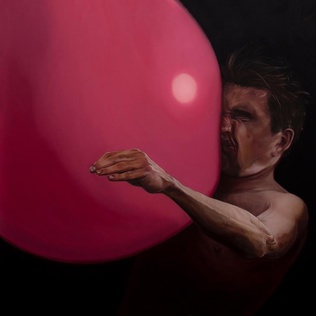O Monolith takes everything that worked about the debut and pumps it up to a new level; its' tighter, less derivative, more inventive and experimental, and certainly more wild. The band incorporate a more hypnotic and krautrock-ian sense of rhythm that draws you into this otherworldly place in which the album sits. There is something unhuman and unhinged about it, which to compare the band to their contemporaries once again, reminds me of black midi's debut, Schlagenheim. While that album achieves this feeling through pure shock value, O Monolith gains it through the atmosphere and tension it builds. At a tight 8 tracks and a sharp 42 minutes, it reminds me of some of the post-punk classics from the vinyl age where every track was vital and there was no superfluous fluff.
Swing (In A Dream) opens up the record with twinkling synths and repetitive chiming rhythm guitar, which sets you straight up to fall into this groovy but sinister record. Ollie Judge's vocals command you to "Live inside the frame, Forget everything, Swing inside a dream" like some evil hypnotist. The track breaks down into a flamenco style sax solo towards the second half before the rest of the instruments come crashing back in with a super thick and meaty bass guitar added to the mix. It's disorientating, chaotic, and disarming. This is followed up by Devil's Den, which starts off much more low-key. The track begins as a quiet swaying tune built around delicate flutes, but in the second half it is flipped on it's head, Ollie starts screaming, the discordant guitars come crashing in and the whole track descends into complete chaos.
Siphon Song really slows it down, bringing OK Computer style robotic vocals set against a slow building post-rock-y rhythm section. The track linearly builds to something louder and more dramatic, but nothing as chaotic and mental as the first couple of songs on the record. It really gives off that late 90s early 2000s art rock vibe. Stick this on a Radiohead or an early Elbow album and I wouldn't have batted an eyelid. Undergrowth returns to the off-kilter grooviness of Swing (In A Dream), complete with a bigger part from the horn section. The horns provide the pulsating beat to the song as Judge sings "I'd rather melt, melt, melt, away". The whole track feels creepy and deranged.
The Blades kicks off the second half and is perhaps my favourite track on the record (and maybe my favourite Squid track overall). The song is built of this descending, spiralling guitar rhythm, and spiky accentuating lead guitar parts. The song is so dynamic, rising up and then slowing down, and then rising back up again. The sinister paranoia of the song is also very much to my taste, as the song slowly morphs from the half way point, becoming more and more tense as Ollie's vocals become more and more insane. The horns sound more and more like sirens and the rhythm section becomes am overwhelming wall of sound, before it all just cuts back to a restrained outro featuring just a chiming guitar and quiet, restrain vocals.
After the madness of The Blades, After The Flash is at a much more plodding march-like pace. But it is equally as sinister, feeling like a march of the undead or some other kind of possessed figure. Like Siphon Song its a much needed breather in the pace of the record. The song progresses in its second half from something sinister to something more heavenly, as the riff ascends upwards - as if the protagonist of the album is attempting to escape whatever trance they are in. This clearly ultimately fails, as the deranged horn section comes slowly back in and descends back down towards the very end of the song, transitioning into Green Light, which is the most has the most intensely repetitive and aggressive groove of the album thus far.
The album closes out with If You Had Seen The Bull's Swimming Attempts You Would Have Stayed Away (what a title I know...). The song was written by the band's guitarist Anton Pearson, and while I do enjoy it to an extent, it does feel a little disconnected from the rest of the record. It's nowhere near as wild as the rest of the album and feels a little out of place because of it. The last minute of the song does build to an intense climax but as a whole the song would've fit much better on Bright Green Field than here.
O Monolith is a great development for Squid and really sets them up as something special, not just another band in the scene. It's intense and atmospheric, and also challenging and chaotic. For me, it has pushed them past black midi as scene leaders (alongside Black Country, New Road), as while bm are still just trying to shock you 3 albums in, Squid are trying to build something greater and more atmospheric (not to knock black midi, I still think Cavalcade is great). If your a fan of the scene, please check it out.
Top Tracks : Swing (In A Dream), Devil's Den, Siphon Song, Undergrowth, The Blades
8/10



.jpg)


